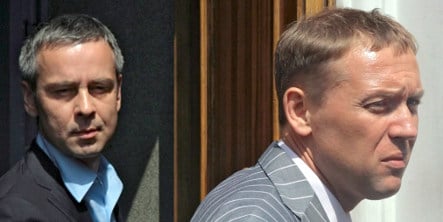Dmitrti Kovtun was with Andrei Lugovoy when they met Litvinenko at a posh London hotel in November 2006. Litvinenko fell ill soon afterwards, and died three weeks later, a victim of radioactive polonium poisoning.
Litvinenko, a former Federal Security Service agent, was a fierce critic of then Russian president Vladimir Putin, and made a deathbed accusation, saying Putin had ordered he be killed.
Lugovoy, a former KGB officer, has been charged with murdering Litvinenko by the British authorities, but remains in Moscow, and was recently elected to parliament there, where he has immunity from prosecution.
Both Lugovoy and Kovtun left traces of polonium, a highly radioactive substance which caused Litvinenko to die in agony, in many places across London and elsewhere.
Kovtun was even treated for polonium poisoning when he returned to Moscow.
Now he and Lugovoy have told British daily The Times Kovtun would be willing to travel to the UK to speak with prosecutors – but only if he felt confident he would not be extradited to the German authorities.
He had visited his former wife in Hamburg on his way to London for the fateful meeting with Litvinenko – and left polonium traces at her house.
Lugovoy told the Times Moscow correspondent, “We have an idea for Dmitri to travel to London to talk to representatives of the prosecutors. We are looking for a way to achieve this if we could get guarantees from the Government of Great Britain.”
Mr Kovtun needs an assurance that if he travelled to London he would be safe from extradition to Germany.
“If we decide to send him to London, it would be the most helpful thing for Scotland Yard to continue the investigation,” Mr Lugovoy said.
Mr Lugovoy would not rule out the possibility that he could travel to London later if Mr Kovtun were not handed over to Germany – and if he received guarantees against his own arrest.
Both men deny involvement in Mr Litvinenko’s death while Mr Lugovoy says was framed by MI6.
“What was beneficial for Russia out of this situation? Russia didn’t gain anything from it,” he told The Times.




 Please whitelist us to continue reading.
Please whitelist us to continue reading.